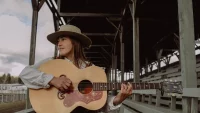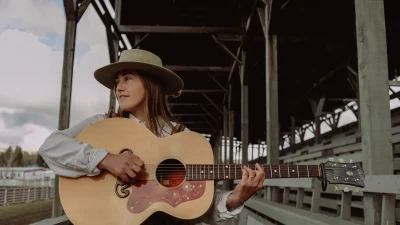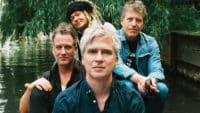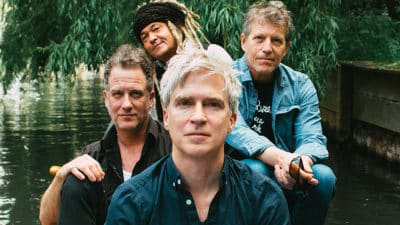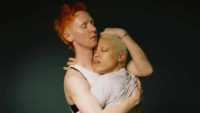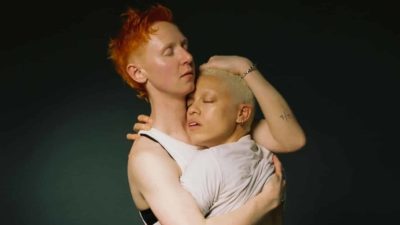Music
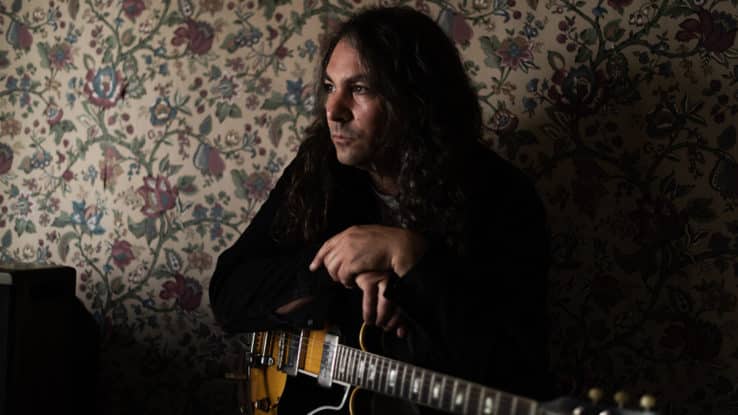
Interview
Adam Granduciel: “What we get to do is such a primal, visceral thing”
The War On Drugs frontman talks fatherhood, fine-tuning and re-discovering the magic of live music that he last left in London back in 2018
“I think sometimes the essence of our records is not boiled down to a feeling but more like a spirit… It’s always a work in motion.” muses Adam Granduciel, stirring a cup of coffee in a Berlin hotel room, halfway through The War On Drugs’ first European tour in four years. Quietly introspective but eager to talk at length, the last few years have seen him become a dad for the first time – just as the pandemic forced his band out of the studio. Change, then, has been on his mind for a long time.
Last taking to the stage at London’s O2 back in 2018, The War On Drugs spent three difficult years working on their fifth album, I Don’t Live Here Anymore, splitting their time between seven different studios. Refining Granduciel’s vocals and evolving the band’s sound, the record sets a high-water mark for The War On Drugs, making it onto every Best Of 2021 list around and raising expectations for the world tour that’s hitting the UK in mid-April.
“Maybe I’ve been gone too long…” he sings on ‘Living Proof’, following it up with a dozen more references to lost pasts and uncertain futures. Now back on the road, where he used to feel the most comfortable, things have changed for Granduciel just as everything seems to take on a new importance. Standing at the biggest crossroads of his career as he sits alone in a German hotel room, Granduciel tells us what it feels like to be back on stage with a whole new outlook.
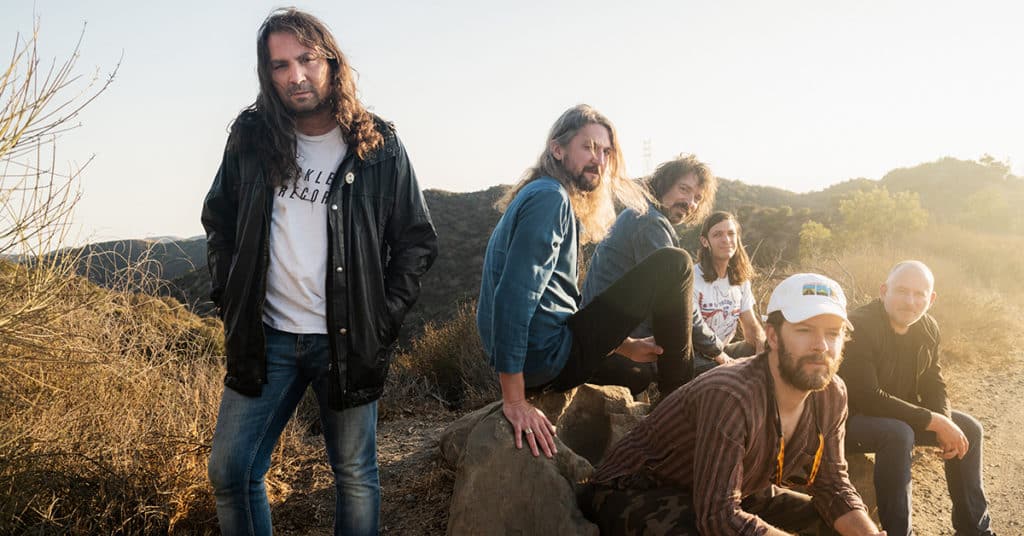
The last time you were in Europe was 2018. After everything that’s happened in the world since, and everthing that’s happened to you in between, it must feel like a very different place for you?
It’s amazing, really, that I never took a break before. It’s like you don’t understand the sacrifices that everybody in your band is making until you have a kid. I didn’t really know what it was like to be away from your family for four weeks, you know? I didn’t know how intense that was. So I think now it’s just really trying to respect that and cherish all the time that we have on the road, but yeah, the band has really grown for having not been able to play together for two years.
Was there a period of adjustment as you all got used to playing together again?
When we all finally reconvened, it took a took maybe half a day to kind of get our bearings. But that night we were back to firing again like we were back on stage at the O2 in ’18. I think it’s just one of those muscle memory things.
How has fatherhood changed you as a musician? How different does this tour feel for you now?
Time is important, y’know? I don’t ever want to be away from him for no reason. It’s tough to be away but at the same time, I want him to know that I had this thing I loved, you know? I want him to see me surrounded by people that I’ve trusted with this passion for a long time. I think that’s important too.
Have you brought him along to hear you play?
He came to the soundcheck at the beginning of our tour, and he just can’t help moving to the sound. It’s like, what we get to do is such an amazing thing, such a primal visceral thing, you know? You feel it making music in my little home studio too, with a one and a half year old running around banging on a keyboard or twisting a knob it makes you realise what this is… this is sound you know? I mean, this should all be fun. It should all be like captivating, in a way that it is for this little one and a half year old.
You spoke before about how different the live band is to the band on the record. Is that something that’s evolved over time?
We have a very special thing on stage, but I’m hesitant to take this band off the stage and go right into a studio. The roles are swapped, so everyone kind of adds to the stew in a different way. You know, Anthony [LaMarca] is a fantastic guitar player, but he’s also an incredible drummer. Like he studied jazz drums, and he just thinks about things differently than somebody else would when we’re recording.
Dave [Hartley] is gonna play bass on every song, you know, he’s been with the band forever. And he’s also like, as unparalleled a player as Robbie [Bennett], on keyboards. I play a lot of keyboards on the record, but so does he – and he’s the one that wrote the hook on ‘I Don’t Live Here Anymore’. There’s no rules in the studio, and people know that they can step out. Everyone has a different spirit.
You worked on I Don’t Live Here Anymore for three years, on and off. What was that process like? Were you constantly reworking songs, or did some settle into place more quickly to guide the others?
Sometimes you spend a year working on a track, tweaking it, only to basically go back to what you originally cut. The song ‘Rings Around My Father’s Eyes’ was basically cut live at Electric Lady [Studios, New York]. I was singing and playing guitar, Anthony was playing drums, Dave was on bass, Jon [Natchez] was playing Wurlitzer and Robbie [Bennett] was playing piano, and that’s a pretty full band right there. We cut it on the second take, but I then spent a year adding keyboards and Mellotron and background vocals and all this extra guitar stuff. And then eventually I just went back to basically what we did in the room! I had a few of my overdubs of sprinkled in, but it was like I’d tried to deconstruct the essence of it. The magic was us learning that song and 10 minutes later, having this tape, you know?
I’m guessing that wasn’t the same for everything though?
Well then there’s something like ‘I Don’t Live Here Anymore’ – that was a track we were just constantly refining. Not even just adding different layers and instruments, but really just processing the sound and having fun messing with certain parts. You just keep tweaking it until it feels right. It’s not perfectionism exactly, it’s more just like we were having fun with the craft, you know? The first time we had that song it sounded like something from [Tom Petty’s] Into The Great Wide Open. The guitar was really singular through an amp, the vocal was right up front and the drums were really tight. But I kept working on it for months and then one day, all of a sudden, it started to sound way more widescreen. You have to let things evolve sometimes.
After three years of tweaking, how do you feel about the record now? Is that desire to perfect and evolve still with you?
I think that’s the thing, because we’re a band that doesn’t like playing to a bunch of tracks off the record, it kind of lets us keep on searching. I don’t really want to keep working on the record after a certain point either I guess. I’m really happy to just be like, here’s the thing, you know?
There are some rough edges still but I don’t feel like anyone ever has to, like, rip the record from my hands, you know? For the first part of the US tour ‘I Don’t Live Here Anymore’ never felt right. I switched to an acoustic guitar, and then it was cool, but then last night in Copenhagen that wasn’t working so I tried this other thing instead… So I think having that live outlet kind of satisfies the need to keep tweaking. It’s like Dylan said, you know, “the song is only truly alive when it’s in its performed state”.
Is that even truer of the older tracks? What’s your relationship with the earlier albums now? Do you feel the need to revisit them with a different energy when you play them live?
Certain songs still feel totally within our set – some of the stuff off Slave Ambient particularly. I think the songs I’m most proud of on the new record, like ‘I Don’t Live Here Anymore’ and ‘Victim’, they’re not that different from the songs we were playing 10 years ago, because those older songs were basically just two or three repeating chords. But then since that time I’ve just learned so much. So like, ‘I Don’t Live Here Anymore’ is the same two repetitive drone chords, but it moves through verses and choruses in a very different way. When we play stuff from Slave Ambient it’s basically the same idea… But it’s also a very early stage of us learning how to do that. So certain songs feel right at home, and others feel like we need to reinvent them.
But sometimes the palate of the band just evolves that way, and it really changes each night. I know that certain songs from A Deeper Understanding just aren’t as interesting to me now as they were on that album cycle. There are some that just aren’t working now. I don’t know, it’s almost like they don’t feel real. We don’t ever want to go through the motions.
Do you ever write music when you’re touring? Can you visualise now what the next chapter of The War On Drugs is going to look like? Are you even able to think about that yet?
I’m definitely thinking about it now, but it’s really hard to comprehend. It’s really hard to write right now because the whole Covid situation has just made this a very isolated tour experience. There’s no endless soundchecks for us to experiment in anymore, and it just takes longer for the stage to get set up.
So I haven’t really been writing, but I am always thinking about it. When I have a week to go into the studio, what am I going to try and do? Am I gonna bring a band in? Or am I gonna just do a week of tape loops? Something for me to sit with for a month and sing over? I’m thinking about the kind of songs we’re playing now that I really connect with too, you know? ‘Victim’ just seems to be getting better every night. So does ‘I Don’t Live Here Anymore’. What kind of songs excite me? And then, you know, hopefully by 2024 or whatever we’ll be back with a new batch of songs. Right now I can’t even imagine that, but there will be a day where that happens. It’s a weird and a wonderful thing.
The War On Drugs are playing the UK and Ireland between April 11-18, returning in June for Bristol Sounds. Tickets are available here.




